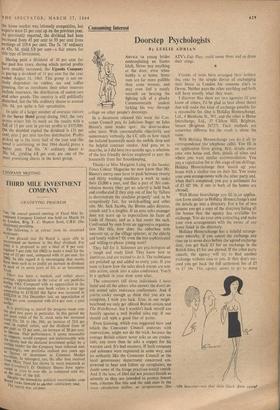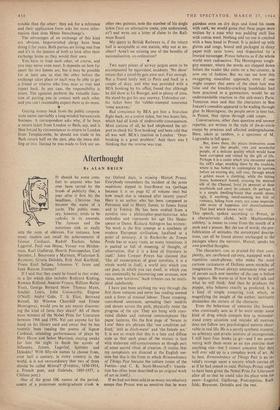Consuming interest
Doorstep Psychologists
By LESLIE ADRIAN ADVICE to young brides contemplating an Easter hitch. Never buy anything at the door, even when hubby is at home. Some men are far more gullible than some women, and may even feel a manly warmth on hearing the fighting talk of a plucky In a document released this week the Con- sumer Council puts its judicious finger on John Bloom's most tender spot : the door-to-door sales team. With commendable objectivity and unnecessary verbosity the CC tells us how much the isolated housewife needs the mobile shop and the helpful itinerant vendor. And goes on to describe, as I did here two months ago, a selection of the less friendly devices employed to part the housewife from her housekeeping.
Thanks to Miss Margaret Laing in the Sunday Times Colour Magazine we now know that Mr. Bloom's merry men have to push between twenty and thirty washing machines a week to make their £3,000 a year, and that a part of this com- mission money (they get no salary) is held back and confiscated if they step out of line by 'failure to demonstrate the machine properly' and, to be scrupulously fair, for switch-selling and other sins. Mr. Jack Jacobs, the Bloom sales director, sounds and Is a toughie. If an area sales.manager does not score up to expectations he faces all kinds of threats, and as a last resort the sack. Confronted by men.from an aggressive organisa- tion like this, how does the suburban wife measure up, or the village spinster, or the elderly and lonely widow? Or even the less sophisticated and willing-to-please young man?
They fall for it. Salesmen arc psychologists of a rough and ready kind. They know how to dominate, and are trained to do it. The techniques arc polished up and added to every year.. If you want to know how the sales shock troops are sent into action, sneak into a sales conference. You'll fit a spyhole in your door soon after.
. The consumers (all those individuals I have listed and all the others who answer the door) do not attend sales resistance conferences. And if you're cocky enough to think that you are an
exception, 1 wish you luck. True, in our neigh- bourhood we only get offered Breton onions and The Watchtower, but I wouldn't back myself too heavily against a well briefed sales rep. if one should call with a good line of patter.
Even licensing, which was suggested here and which the Consumer Council endorses with reservations, might not do the trick, because the average British citizen never asks to see creden- tials, any more than he asks a copper for his warrant card. It's bad manners. If both company and salesmen were registered in some way, and an authority like the Consumer Council or the local government department concerned em- powered to hear and follow up complaints, no doubt some of the fringe practices would vanish.
And if the laws of libel did not protect frauds as securely as they are intended to protect honest men, columns like this and the odd ones in the mass circulation dailies, or programmes like ATV's Fair Play, could name them and so draw their stings.
Friends of mine have arranged their holiday this year by the simple device of exchanging their house in London for someone else's in Devon. Neither pays the other anything and both will have exactly what they want.
I discover that there are two agencies (if you know of others, I'd be glad to hear about them) that will make this kind of exchange possible for a reasonable fee. One is Holiday Homexchange, Ltd., 4 Blenheim St., WI, and the other is Home Interchange, Ltd., 37 Clifton Hill, Brighton, Sussex (Brighton 26727). Their methods arc somewhat different but the result is about the same.
With Holiday Homexchange you do it all by correspondence (no telephone calls). You fill in an application form giving, first, details about your own home and, then, details of when and where you want similar accommodation. You pay a registration fee at this stage of ten shillings. Holiday HomeXchange then 'match up' your home with a similar one on their list. You make your own arrangements with the:other party and, when that's completed, you pay a settlement fee of £5 (£7 10s. if one or both of the homes are abroad).
With Home Interchange you fill in an applica- tion form similar to Holiday Homexchange's and the details go into a directory. For a fee of two guineas you get a copy Of the directory listing all the homes that the agency has available for exchange. You do your own contacting and make your own arrangements with the owner of any home listed in the directory:
Holiday Homexchange has a helpful arrange- ment whereby, if you cancel the exchange any time up to seven dayk before the agreed exchange date, you get back £3 for an exchange in the British Isles, £5 for one abroad. If the other party cancels, the agency will try to find another exchange without cost, to you. 1 1 they don't suc- ceed you. get back 'the full settlement fee of £5 or £7 10s. This agency seems to go to more
'Oh heavens—not that lade black drevr trouble than the other: they ask for a reference and their application form asks for more infor- mation than does Home Interchange's.
The advantages of an exchange of this kind are obvious. Impoverished clergy have been doing it for years. Both parties are living rent free and it's in the interest of both to look after their exchange home as they would their own.
You have to trust each other, of course, and you may never even meet. It depends on how far apart the two homes are, but it may be possible for at least one to visit the other before the exchange takes place or each may be able to get a friend or relative who lives near to visit and report back. In any case, the responsibility is yours. The agencies perform the valuable func- tion of putting you in contact with each other and you can't reasonably expect them to do more.
*
Getting money back from the public corpora- tions seems inevitably a long-winded bureaucratic business. A correspondent asks why, if he buys a return ticket from Lpndon to Bath, say, and. is then forced by circumstances to return to London from Templecombe, he should not trade in his Bath return half on the spot, plus the extra shil- ling or two. Instead he was made to fork out an- other two guineas, note the number of his single ticket (not an alternative route, you understand, sir) and write out a letter of claim to the Rail- ways Board.
My query to British Railways is, if the return half is acceptable at one station, why not at an- other? Aren't we missing one of the benefits of nationalisation, co-ordination?
Two nasty pieces of airway jargon seem to be accompanied by equivalent incidents. 'No show' means that a stand-by gets your seat. Fair enough. But a friend lately sent to Paris and back in a, couple of days, and who was provided with a BEA booking by his office, found that although he did show at Le Bourget, and in plenty of time, the stand-by got his seat anyway. Unkindest cut: his ticket, bore the rubber-stamped assurance
'FIRM BOOKING.'
Bad conscience by BEA got him a first-class flight back, on a tourist ticket, but two hours late, which had all kinds of undesirable consequences. Most curious of all, he had telephoned the air- port to check his 'firm booking' and been told that all was well. BEA's reaction in London: 'Over- booking is a great problem.' And there was I thinking that the reverse was true.



































 Previous page
Previous page